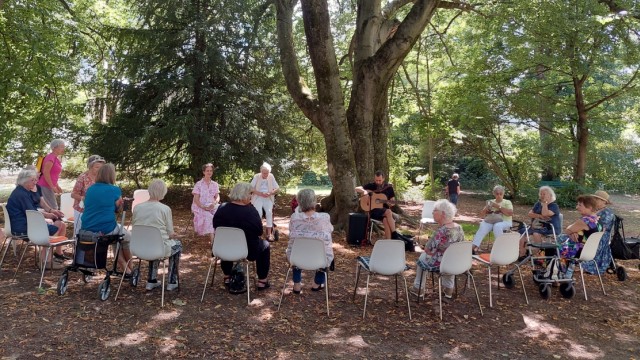Munich pub choir
“Sing and drink, drink and sing” – that is the concept of the Munich pub choir. The rehearsals take place in a restaurant, and the outfit for the performances includes a bottle of beer as well as sweatpants and a white fine-rib shirt. “We are a sociable club,” says board member Sanna Bogner. The choir has its origins in a Facebook post by Lisa Reuter and Mona Walch. In 2013 you posted a call: “Munich needs a pub choir.” A group of amateur singers quickly came together. The demand was so high that not everyone could be accepted and to this day there is a long waiting list and a strict audition process. The choir now has more than 60 members, half women and half men.
Musical talent and lyrical confidence are not the only requirements. “It also requires a high level of commitment,” says Bogner. “It’s a time-consuming hobby.” Every Thursday the choir rehearses songs by Britney Spears, Rage Against the Machine or Nirvana in a secret pub. After singing, we drink a beer and chat. Friendships have developed like this, some have even fallen in love with each other. The choir, led by Linus Mödl, has already performed at the Oktoberfest, at its own anniversary festival in the Backstage Club and in the Müllersche Volksbad. “We put water in our mouths and gargled,” says Bogner. On a mini-tour to Switzerland they sang with a choir in Basel that had the same concept. “However, it’s called the Beizenchor there.”
Further information: www.muenchnerkneipenchor.de
Witches of Westend
The Witches of Westend at the Brecht Festival in Augsburg 2023.
(Photo: Bruno Tenschert)
“We see ourselves as a feminist-minded choir,” says Pola Dobler. The 37-year-old is the founder and director of the “Witches of Westend”, a choir in which only women sing. “I come from a musical family. My mother and my grandmother in particular influenced me,” she says. Dobler was already in the choir at school, a music high school. However, it remained just a hobby. She didn’t want to make music her career because she was afraid of losing her passion for it.
The idea for an all-female choir came to the Munich native in 2013 when she returned to her hometown from studying European ethnology in Berlin. “I had the feeling that singing is often associated with shame and fear for women,” says Dobler. “That’s why I wanted to create a safe space where people have confidence, where they don’t feel embarrassed, where they’re sure they won’t be laughed at. A place where prejudices are fought.”
The first rehearsals took place in their former shared room in the Dreimühlenviertel. Her friends brought other friends with them, they drank Prosecco, smoked cigarettes and sang songs that Dobler had chosen. But these were too difficult because most of them were beginners and had no choir experience. “A three-part piece was too ambitious, and I also had to grow into the role of choir director,” says Dobler. She selects songs by women with feminist lyrics, arranges pieces by the Beatles or the Düsseldorf Düsterboys and composes her own songs.
After moving to Westend, the now 17 women rehearsed in their living room under a new name, “Witches”, “Hexen”https://www.sueddeutsche.de/muenchen/.”It is a feminist symbol, our texts are often political and we have become a network that supports each other beyond singing,” says Dobler. When they perform at the Kunstraum Lothringer 13, at Walpurgis Night or at the Brecht Festival in Augsburg, they often wear outfits with a color concept, such as lilac clothing or certain combinations, such as yellow trousers and a blue blouse. “Sometimes we have lights in our eyes,” says Dobler. The glowing lamps are also intended to increase the visibility of women in music. Once they rewritten the fight song of the socialist workers’ movement to “Witches of all countries unite.”
www.instagram.com/mystic_choir_kollektiv/?hl=de
Frida & Kurt

Frida & Kurt is an urban project and is primarily aimed at older people.
(Photo: Munich Cultural Department)
“The most valuable moments are the moments in which the group itself gets into action,” says Philip Lipsky about the singing project “Frida & Kurt”. He means those hours in which the participants discuss lively – about what they want to sing or what someone no longer wants to sing because it seems out of date to him or her. These can be songs that are reminiscent of politically dark times in this country, says Lipsky, or that no longer sound right from a feminist perspective. The tearjerker “But you only exist once for me” is one such example. In the sixties, back then by the Nilsen Brothers performed with a rolling R, no one was offended by lines like this: “Just the thought that I could lose you one day / that another man would one day call you his own.” But today, as one lady criticized, it is no longer possible to “be the property of a man.” Lipsky thinks it’s good when participants think about things like that. He wants them to come into contact beyond singing together.
“Frida & Kurt” is a project by the Munich Cultural Department and is explicitly intended as a “participatory singing lesson”. It is intended to appeal primarily to older people, which is why a free transport service is offered for those who cannot make the journey alone. But young people are also very welcome, emphasizes Lipsky and mentions a mother who always brings joy to the others with her small child. Since summer 2019, the singing lessons have been taking place regularly in the districts of Berg am Laim, Giesing and Sendling. In addition to Lipsky, Veronika Lindner and Constanze Weiß also lead the lessons. Sometimes only five people gather, sometimes up to 25 people. The single riders can never be sure exactly how the lesson will unfold.
Lipsky is a trained music therapist and works in a geriatric facility. He says he likes dealing with older people. Apart from a welcome song and two fixed farewell songs, he rarely dictates what is sung. The suggestions come from the group; he usually knows them and accompanies them on guitar or piano. Many folk songs such as “Im Frühtau zu Berge”, but also the Dietrich hit “Lili Marleen”, songs by Caterina Valente and Freddy Quinn are in demand. “I don’t want everyone to be able to sing along,” says Lipsky. The focus is on being together and remembering. “But it’s surprising how textually confident the old people are.”
Further information: www.volkskultur-muenchen.de
Go Sing Choir

Choir leader Jens Junker (left) and guitarist Ian Chapman actually manage to make you feel like a rock tube.
(Photo: Pius Neumeier)
It’s a feeling between fear of failure and delusions of grandeur when you stand in the crowd and look at Jens Junker. He gives you the chance to sing in, and you’re embarrassed to hear your own, completely untrained voice squeak next to the confident tenor belting into your right ear. But laughter also loosens the facial muscles, and so the sounds not only gain in stature around you, but also in your own throat. Junker is the amazing leader of the Go Sing Choir, who controls the major event, which is booked out quickly in advance. There are pop songs like “Here Comes the Sun” by the Beatles or “Creep” by Radiohead, which Junker arranges, meaning it can be sung by hundreds of people. At his side, the HFF graduate has the guitarist Ian Chapman, otherwise only his obviously great ear and his patience to produce a passable result in two hours with a constantly remixed group.
The choir is a guest at Strom on Lindwurmstrasse once a month; the ticket costs 15 euros. Each event is videotaped and published. Junker and Chapman are also at Tollwood or the Ander Art Festival, the alternative event to the (also intercultural) Oktoberfest that emphasizes interculturality. There, people sing on Odeonsplatz against the bells of the Theatinerkirche, which chime every quarter of an hour. This was achieved in 2023 with Tina Turner’s rather demanding song “We don’t need another hero”. The final run was so uplifting that you felt like a rock queen, roaring at the top of your lungs.
Further information: www.gosingchoir.de

